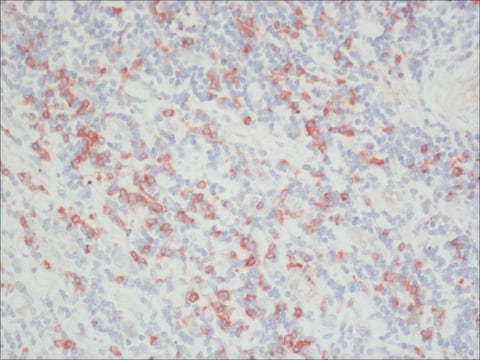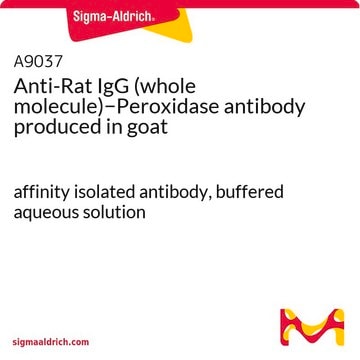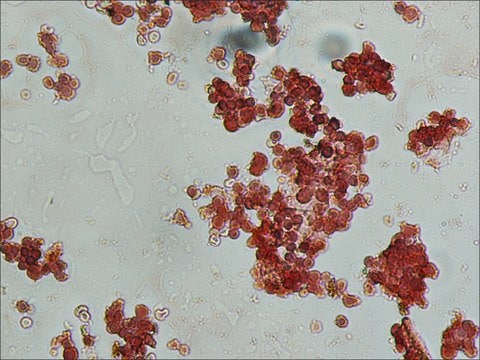GENA935
ECL™ Rat IgG, HRP-linked whole antibody (from goat)
Cytiva NA935
Synonym(s):
Rat IgG antibody
Sign Into View Organizational & Contract Pricing
All Photos(1)
About This Item
UNSPSC Code:
12352203
NACRES:
NA.46
Recommended Products
antibody form
Ig fraction of antiserum
antibody product type
primary antibodies
feature
wetted part: no
packaging
pkg of 1 mL
manufacturer/tradename
Cytiva NA935
color
Brown (light)
shipped in
wet ice
storage temp.
2-8°C
General description
The antibody is prepared by hyper-immunizing goats with purified immunoglobulin fractions from normal rat serum to produce high affinity antibodies. The pooled antiserum is used to produce an immunoglobulin preparation which is then affinity adsorbed to remove cross-reacting antibodies towards mouse, human and rabbit immunoglobulins. These activities are thoroughly depleted to ensure species-specificity. Finally, to select for specific binding to rat IgG, the antibodies are purified using an affinity column of rat IgG. After washing to remove non-specific serum components and low affinity antibodies, the species-specific antibodies are eluted using carefully selected, mild conditions which minimize aggregation and preserve immunological activity, yet which will elute high affinity antibodies.
Features and Benefits
- Highly species-specific.
- Optimized for use with our range of ECL™ Detection Reagents.
- Recommended dilutions to minimize background.
Storage and Stability
Please be aware this product may be shipped 90 days before the expiration date. For more information on the batch specific expiration date, please contact technical service.
Analysis Note
To view the Certificate of Analysis for this product, please visit www.cytiva.com.
Legal Information
ECL is a trademark of Cytiva
Not finding the right product?
Try our Product Selector Tool.
Signal Word
Warning
Hazard Statements
Precautionary Statements
Storage Class Code
12 - Non Combustible Liquids
Certificates of Analysis (COA)
Search for Certificates of Analysis (COA) by entering the products Lot/Batch Number. Lot and Batch Numbers can be found on a product’s label following the words ‘Lot’ or ‘Batch’.
Already Own This Product?
Find documentation for the products that you have recently purchased in the Document Library.
Customers Also Viewed
Magnus Stårsta et al.
PLoS genetics, 16(2), e1008607-e1008607 (2020-02-14)
RHS elements are components of conserved toxin-delivery systems, wide-spread within the bacterial kingdom and some of the most positively selected genes known. However, very little is known about how Rhs toxins affect bacterial biology. Salmonella Typhimurium contains a full-length rhs
Elisabet Barbero-Camps et al.
Autophagy, 14(7), 1129-1154 (2018-06-05)
Macroautophagy/autophagy failure with the accumulation of autophagosomes is an early neuropathological feature of Alzheimer disease (AD) that directly affects amyloid beta (Aβ) metabolism. Although loss of presenilin 1 function has been reported to impair lysosomal function and prevent autophagy flux
Waqas Azeem et al.
Biomedicines, 9(8) (2021-08-28)
Modulation of β-catenin signaling has attractive therapeutic potential in cancer immunotherapy. Several studies have found that β-catenin can mediate immune evasion in cancer and promote anti-inflammatory features of antigen-presenting dendritic cells. Many small molecular compounds that inhibit Wnt/β-catenin signaling are
Kristin A Knouse et al.
Cell, 175(1), 200-211 (2018-08-28)
Much of our understanding of chromosome segregation is based on cell culture systems. Here, we examine the importance of the tissue environment for chromosome segregation by comparing chromosome segregation fidelity across several primary cell types in native and nonnative contexts.
Vicente Roca-Agujetas et al.
Molecular neurodegeneration, 16(1), 15-15 (2021-03-10)
Emerging evidence indicates that impaired mitophagy-mediated clearance of defective mitochondria is a critical event in Alzheimer's disease (AD) pathogenesis. Amyloid-beta (Aβ) metabolism and the microtubule-associated protein tau have been reported to regulate key components of the mitophagy machinery. However, the
Our team of scientists has experience in all areas of research including Life Science, Material Science, Chemical Synthesis, Chromatography, Analytical and many others.
Contact Technical Service











